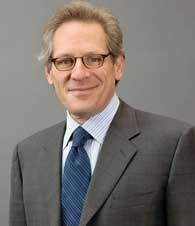|
Executive Interviews: Interview with Tamara J Erickson on Managing Troubled Times
March 2009
-
By Dr. Nagendra V Chowdary
 Stewart D Friedman
Stewart D Friedman Stewart D Friedman, Stewart Friedman, Practice Professor of Management Director, Wharton Work/Life Integration Project 
Should all the CEOs necessarily be
leaders? Can all the leaders be CEOs?
When boards make their CEO hiring
decisions, what do you think should
be the guiding principles?
The key decision criteria for selecting
people to hold positions of authority
and responsibility is whether they
will be accountable for competently
pursuing the goals of the collective. In most MBA curricula, leadership
may be just one of the many courses
offered. Should a course in
leadership be made mandatory at
business schools? If yes, what
according to you is the best form of
delivery?
|
|
Since 1991, the Wharton School has
required that allMBA students take at
least one course in leadership. It is
mandatory. I believe this is important
and that all business schools should
follow the same policy. What according to you should be
the role of organizations in nurturing
and developing leadership talent
within the company? GE has always
been known as a CEO Factory. What
should other companies do to
improve their bench strength? And
also is there any danger when too
many leaders are developed with too
few leadership positions (at the top)
to be filled?
My view on this is simple: The more
leaders, the better. I’d much rather have the problem of having too many
great people who are committed to
serving my organization’s interests
than having too few. Right now, companies across the
globe are facing unprecedented times
requiring them to fight many battles –
excess employees, inventory piling
up, growth conundrums, exchange
rate setbacks, impatient capital
markets, horrendous decrease in
market capitalization and share prices
and pressures on profitability. It
seems that any solution to one
problem leads to another problem.
How should companies plan to come
out of this vicious cycle? What
according to you should be their
priorities and how should they
address them?
This is a complex and difficult
question. My short answer is that the
best companies account for the
interests of multiple stakeholders and
creatively seekways of integrating the
various interests represented by these
stakeholders. To do this well requires
that responsible executives maintain
and cultivate means for healthy
dialogue. What is your advice to all such
people going through such traumatic
times? What are the few things that
they should keep a tab on and keep
working on so that life, if not as it
was, at least does not deteriorate?
What is the role of leadership in
setting and achieving such higher
order goals during such troubled
times?
I’ve written a number of blogs on this
subject. The short answer is this:
now is the best time to take a cleareyed,
serious look at what matters
most in your life and then take action
to better align whatmatters with what
you do every day. You have observed in an
interesting piece (Dial Down the
Stress Level, HBR, December 2008)
that, “The knee-jerk response in an
economic downturn is to wring
greater productivity out of your workforce by making employees
work harder. But this can hurt more
than help by fueling resentment and
burnout” Why is it so?
Themore control employees feel they
have over their work and personal
lives, the more resilient and effective
they’re going to be in performing their
jobs. As an alternative to this problem,
you have suggested a smarter
approach. Can you please elaborate
on this for the benefit of our readers?
My approach is to focus on the things
that matter most to people and to find
creative means for organizing that
enable them to pursue these things in
ways that benefit the organization and
the society. My research has shown
that when you account for the
interests of the whole person,
paradoxically, you get better results in
your business.
1.
Troubled Times Case Study
2. ICMR
Case Collection
3.
Case Study Volumes
|
The interview was conducted by Dr. Nagendra V Chowdary, Consulting Editor,
Effective Executive and Dean, IBSCDC,
Hyderabad. This interview was originally published in Effective Executive, IUP, March 2009. Copyright © March 2009, IBSCDC
No part of this publication may be copied, reproduced or distributed, stored in a
retrieval system, used in a spreadsheet, or transmitted in any form or medium –
electronic, mechanical, photocopying, recording, or otherwise – without the permission
of IBSCDC. |
